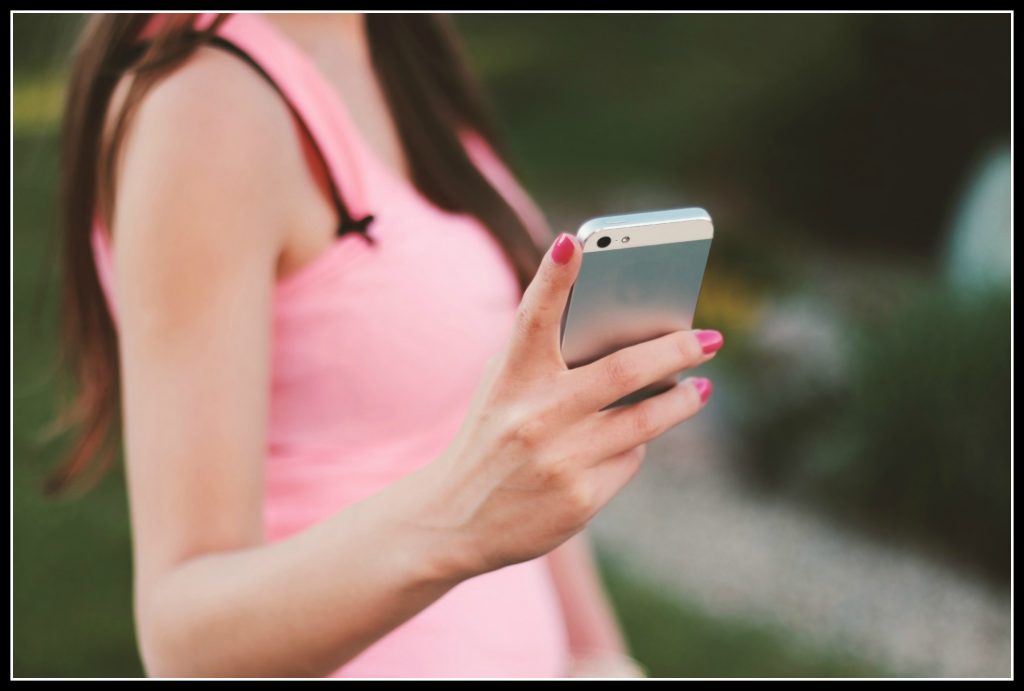What Is the correct age for a child to have their own smartphone? This is a thorny question and one I found myself being asked in a radio interview earlier today.

In an ideal world, I don’t think our kids would get smart phones until they were well into their teenage years. Alas, the world is far from ideal. As much as I want to keep my kids away from such technology for as long as possible, I doubt my wife and I will be able to keep the floodgates shut much beyond the age of 11.
This discussion has been sparked by former Government policy adviser Steve Hilton. An extract from his book, More Human: Designing A World Where People Come First, has just been published by a national newspaper.
In the extract, Hilton argues that we’ve gone too far by sheltering our children from physical dangers. He says we no longer promote decent, physical outdoor play. Hilton believes we have instead given our kids unrestricted access to the internet via smartphones.
This, he says, is damaging young people’s social skills, introducing them to porn and giving them unrealistic expectations of sexual relationships. Interestingly, he says it is also leading to an increase in body confidence issues for both girls and boys.
Hilton’s radical solution is to ban smartphones for those under the age of 16. I’m conflicted on this issue. My heart agrees with him, my head doesn’t.
Earlier today I found myself being invited on to BBC Radio Kent to discuss the issue with presenter Julia George and Jo of the Guilty Mother blog.
I think we all largely had the same ideas. Jo made one very interesting comment that stuck in my mind. She said that in her childhood, if you wanted to know where your friends were, you went and found a pile of bikes scattered across the ground somewhere. This isn’t something you really see today.
When it comes to my own kids, they are IT literate, but Mrs Adams and I have always encouraged the children to be sociable. They join in team games and group activities. Part of the thinking behind this is to make them realise that real life relationships must come first. I would hate them to reach their teenage years and think the way you made friends was via Facebook or Snapchat.
Alas I’ve seen numerous people, teenagers and people in their twenties, sucked into a world where relationships exist largely online. I don’t want my children to live their lives this way.
Maybe my generation was the last to disappear off on bikes and return home when hungry? Was mine a golden era of childhood? I certainly hope not.
Even so, technology is all around us. Adults and children alike are so reliant on it. Just yesterday I was in the school playground waiting for my eldest daughter at collection time. My three year old daughter took my phone out of my hand and within seconds was watching a cartoon using an app. I haven’t shown her how to do this, she’s picked it up by watching us adults and her older sister.
Hilton admits a ban on those under 16 having smartphones wouldn’t be 100% effective. Even so, he points to the age restrictions on cigarettes and alcohol, both of which work very well. At the very least they have created a society where underage drinking smoking are discouraged.
Hilton is well known for coming up with ideas that are, shall we say, creative. A ban on smartphones for those under 16 may seem unrealistic, but it is a very compelling suggestion and one worth thinking about. Who knows, it may have some far reaching and very positive effects on society.
Following the radio interview, Jo published this awesome guide to smartphones on her blog and how to oversee your child’s use of them. I thoroughly recommend taking a look as it suggests a few phones, has recommendations for the setting and provides other useful hints and tips.
What do you think, should we ban young people from having smartphones? Has childhood changed irrevocably? Please leave a comment with your thoughts.
Pic credits: Picture of teenager holding phone; Pexels. Cell phone use in class sign, Wesley Fryer. Both images edited by John Adams and reproduced under Creative Commons agreement







7 thoughts on “Should we ban children under the age of 16 from smartphones?”
It’s a really interesting idea but I don’t think it quite works in practice. In the modern day kids will still need access to laptops and tablets to do their school work so they can do as much on those as on a smart phone, they just can’t take them with them.
Rather than prohibit them, it feels that we should encourage and build strong relationships with our children. In doing so we can then explain to them the role technology plays in their lives, encourage them to socialise and be active.
At the moment I suspect we’re all not setting the best examples as parents though: over using our phones, whatsapping friends rather than talking, getting distracted on twitter rather than going outside for a walk. I know I need to change my behaviours before my daughter gets too much older so that I practice what I preach!
Yeah, I think Hilton missed that point; kids use non-mobile tech to complete homework from a very young age. They have web access from early childhood. Evenso, I thikn a ban could work, or at least have a major impact.
Truth is, and you have made the point very well, us parents have a lot to answer for!
Don’t disagree with Hilton but this is an impractical suggestion.
There is no mention or suggestion re: how to enforce such a ban.
Children are extremely resourceful and would find a way to ‘swerve’ any such ban.
There are many issues around children using tech and media and the negative impact it can have – most organisations who work to address this issue do so by encouraging open dialogue and trust building between parents and children – parents’ relationships with their children are paramount! banning under 16’s would encourage deceitful or secretive use of phones which has potentially harmful consequences not just for children’s health, safety & well-being but also for relationships between parents and children.
Comparing smart phones to alcohol & tobacco is like comparing apples and oranges – alcohol and tobacco are harmful substances full stop! – yes, smart tech can be harmful if not used properly and especially amongst children but it is a huge part of their future – the generation you refer to are the tech generation (like it or not); they are encouraged to use, understand and utilise technology – it forms part of their everyday lives, with friends, at school as per of learning, in their home lives, employment environments.
And what happens if they are ‘caught’?
Are they criminalised? Or are their parents criminalised? Fines in difficult times??
An 11, 12, 13 (etc) year old cannot get a phone contract? Parents must acquire it for them – if you don’t want them to have one then don’t provide one; it’s fairly simple.
Parents should be responsible for their children; not the state.
If your child complains because they haven’t got a smart phone & their friends all have them, you have to use YOUR judgment.
Good parents know their child better than anybody else. If you don’t want them to have one, don’t provide them with one.
TV’s can be switched off, wifi can be disconnected, phones and tablets can be put to one side. We are free to make choices and we should be more self-aware – and the above comment about setting examples is spot on…
If you don’t want your kids to do something, don’t do that something in front of them – at least not to excess.
I quite agree that good parents will limit such activities and will not be swayed by peer pressure. I’m also against state intervention wherever possible.
I do, though, think Hilton has made a very interesting point. Yes, tech is all around us and our children must get used to it. In fact I think a gaping hole in Hilton’s argument is that kids, from year 1, are expected to use computers to complete various homework tasks. They may not be using mobile devices, but from a young age, kids have web access.
But….if the state were to intervene, I think it could work. I think the comparison between tech and alcohol / cigarettes is like comparing oranges with oranges. Virtually every house had alcohol in it. Of course teenagers tend to raid the booze cabinet when mum and dad aren’t around, but by that point they have learned that alcohol is something you should use in moderation. I think the same could work with tech.
I have two girls 11 &12 they both have smart phones. Personally I feel we should imbrace technology. Not only have apps helped them in the past with things like learning fractions and telling the time.. They are crucial in mantaining their friendships. They use mostly Instagram, You tube and FaceTime. They talk with friends in the evening. Basically a very important part of their lives.
I’ve put a lot of work into keeping them safe online. I’ve had many conversations and pointed out articles on the press. To help them learn of possible dangers..
To ban children from smartphones to me is an outragous suggestion. Kind of like Mary Whitehouse.
To me it’s like saying don’t let a child climb a tree incase they fall. Or all lakes must have a fence around them. How are children supposed to learn?
The suggestion hasn’t met with universal approval, as you can see from the comments. That said, I don’t think it is quite as barmy as it first appears.
You say “how are children supposed to learn?” They learn using computers, not smartphones. My kids also use YouTube for educational purposed. It’s a great learning tool. I would also be very worried if my kids used Instagram and FaceTime to keep up with friends every evening. Technology should really be complimentary to face to face friendships, it shouldn’t govern them.
Most people in society are very reluctant to imagine if phones can be taken away from their young children. For me personally, mobile phones were built with an adult user in mind and still do. Handing a piece of an amazing workable private technology…Isn’t that going to excite them that they are now like any other adults around them? Won’t it make them feel over empowered and perhaps arrogant to be an owner of an expensive private device, which nobody else can peek through considering it’s only theirs and is private to them? Isn’t that going to get them off track of their usual routine or perhaps make them lose all natural childhood activities? Won’t that small private device will encourage them to look out for things that they perhaps were scared to check on other devices such as laptops and tablets?
Now, what if they didn’t have access to smartphones? What harm it’ll make. Surely there are other technologies to help them facilitate with the homework and keep them safe or we can certainly invent one without giving them access to pornography, Facebook, and Instagram the platforms which are not even meant for children. Not every parent is smart enough to keep a correct balance of use and kind of use. If the state takes some responsibility, it can be a great help to most parents who have so many other things to worry about instead of keeping a 24/7 eye on their child. If all parents were all able, Govt wouldn’t have to put a tax on sugar or ban cigarettes’. Recently, the New Zealand govt has banned even specific age group adults from smoking….what is important is important especially where vulnerable children are involved, the state should intervene.